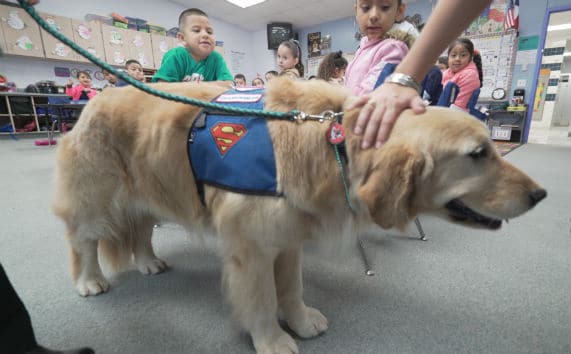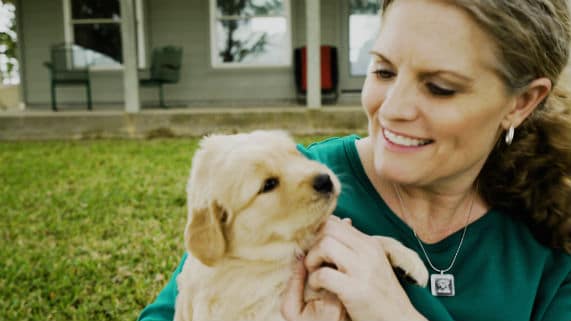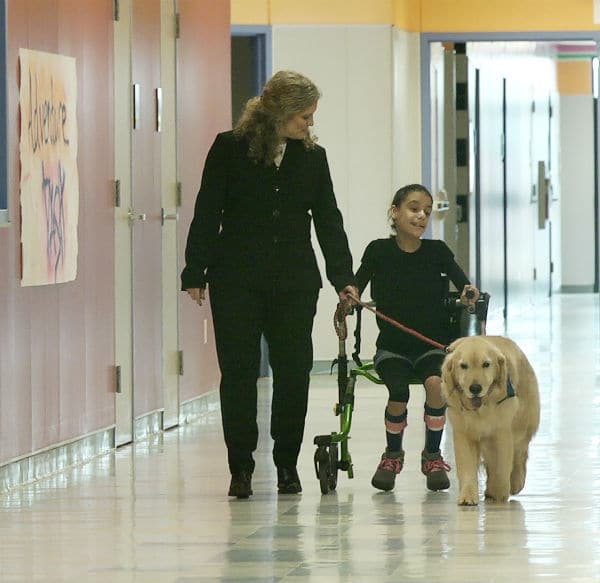Variants of the phrase “dogs are man’s best friend” have been around for centuries. Voltaire wrote a definition of dogs in his 1764 dictionary. It read, in part, “It is of all animals the most faithful; it is the best possible friend of man.”
Dogs, like good friends, can provide comfort. Some dogs are so good at it that they make it their life’s work. Josie is one of those dogs.
Josie is a Golden Retriever and Kim Pruitt’s co-counselor at Waller ISD. Pruitt also has two Australian Shepherds, Hank and Remy, who work in the district as co-counselors. Pruitt got into school counseling largely because of Josie.
The Beginning of a Career in School Counseling
Pruitt didn’t intend to be a school counselor or even a teacher when she was in college. She earned her bachelor’s degree in environmental studies and forestry from Utah State University.
“I did not go to school to be a teacher. I had a science degree. I just fell into substitute teaching. I ended up loving education as a career,” she says.
Pruitt continued to teach, first in Arizona, then she came home to Texas. Back at home and teaching in Texas, Pruitt decided to try dog competition. She thought Josie would be perfect for these competitions, which involve things like agility, conformation and obedience, but Josie thought otherwise.
“She did not like conformation and looking pretty,” she says of Josie. “I thought, ‘Well, I’m not going to make her do that.’ I thought there’s got to be a purpose. I’m going to see if there’s something else I can provide and encourage — an option for her.”
Josie’s resistance to the competition world ended up opening a whole new world to her owner. Pruitt took Josie to the Walmart near her home in Navasota, Texas to greet people as they left the store. During that greeting session, Pruitt says she had “a very inspiring moment that really transformed all of my thoughts and got me to where I am today.”
That moment involved a married couple who walked out and saw Josie. The one-and-a-half-year-old dog walked up to the man, gazed up at him, and gently put her paw on his waist. They connected immediately.
“The woman looked at me and tears just started welling up in her eyes,” Pruitt recalls.
She spoke with the couple and learned that the husband had cancer.
“The wife was deeply touched how Josie just moved towards him and just provided a moment of comfort in a crazy, chaotic time in their lives,” she explains.
Pruitt was struck by the experience and knew she needed to learn more about dogs’ role in comfort and therapy. She did some research online and in her community and found some materials to learn how to be a therapy dog handler.
Pruitt decided that Hank, who did take to competition after Josie got out of it, might also be a good fit for counseling work. She decided to look into how to introduce the dogs into a school setting. She registered both Hank and Josie as therapy dogs and Reading Education Assistance Dogs. Remy, the newest member of this counseling team, is also registered and certified in therapy work. She’s also the main character in a social skills story that Pruitt is writing and hoping to publish. Pruitt also recently added a new Golden Retriever puppy to her team. Story (pictured below) will also train to become a therapy dog.
Getting Started With Therapy Dogs
Pruitt did a lot of research about therapy dogs and how others were using the animals in schools. She found some information that supported her desire to get her pups involved in her work as a school teacher.
She was working at Magnolia Junior High in Magnolia ISD at the time and presented her case to the building principal, Brenda Marfin, who was very supportive.
“I started introducing Josie into my school after finding out the protocol, getting permission to have my school as an official visit site,” Pruitt says. “As a classroom teacher, I would bring her to school with me. We greeted students as they arrived at school. Josie would spend most of the day in my classroom. During my conference period, I would reach out to other classrooms, kids that were in in-school suspension, finding staff that I thought might need a little bit of encouragement during the day.”
And even though Pruitt loved being in the classroom and teaching, she felt she could make an even bigger difference through her work with her newly certified therapy dogs. So she decided to go back to school.
Next Step: Graduate Degree in School Counseling
Pruitt was working as the chair of the science department when she began her therapy dog training. Her dogs had passed the tests to become certified, and now it was her turn to get some additional training. But where to start?
“I looked into the possibility of going back to graduate school, but that meant a 45-minute drive,” she explains. “I thought, ‘There’s got to be an option.’ I started talking to colleagues of mine who said that they had gone back to school. One of them had gone back to Lamar University for a master’s in educational leadership.”
She began researching Lamar University and found the online M.Ed. in School Counseling program. Online meant no lengthy commute from her home in Navasota.
“With the encouragement of my building principal, I applied for graduate school through a school counseling program,” says Pruitt, who was in her 20th year as a teacher. “I started in February of 2013. I knew I needed to do something that would allow me to venture beyond my classroom, even though I was very content, maybe really finding out what therapy dog programs are.”
Valuable Research in Animal-Assisted Therapy
Pruitt began attending conferences on therapy dogs and even began doing her own research through her online graduate program at Lamar University.
She connected with Dr. Rebecca Weinbaum, who is the department chair for Lamar University’s Department of Counseling in the College of Education and Human Development. When Dr. Weinbaum heard what Pruitt had to say about her interest in animal-assisted therapy, she was in. The pair set off to do some qualitative research together.
“My world pretty much opened up at that time,” Pruitt says. “The ability to have someone that would reach out and work with me on something that was not required — it’s a non-thesis program — it gave me the opportunity to really develop into who I am today as a school counselor.”
In their research, Pruitt and Dr. Weinbaum asked 7th and 8th graders, as well as some faculty and parents, to write about their experiences with Pruitt’s therapy dogs. They collected 566 responses and did some qualitative data analysis to find themes based on the students’ perceptions about the dogs in the school setting.
“The information that came back was just incredible,” Pruitt says. “The writing samples that the students gave, because they knew they weren’t being judged, have brought many people to tears.”
What Pruitt saw reinforced her belief that the dogs were making a positive and significant impact on the students, parents and staff.
“My kids would say the dogs are an antidepressant that doesn’t come in a pill form. For a junior high student to say that the dogs are superheroes to the school, and these are 7th grade girls, boys — it came across a number of times without knowing that the other had written it, that the dogs were superheroes in the school, changing lives, saving lives one paw at a time, an unconditional acceptance,” Pruitt says of the writing samples.
The students also consider the dogs friends. The animals help prevent bullying and are a confidence builder for quiet students. They are motivators and calming agents. Pruitt says that the students are always asking when she’s going to bring the dogs to their classes. They’re very popular.
Pruitt says the dogs have been helpful in other important areas, such as grief counseling. Students who are coping with the death of a classmate, friend or family member are able to find comfort and solace through these loving animals.
Teaching Lessons on Therapy Dog Work
After completing her research and her master’s degree, Pruitt began sharing what she learned at various conferences around the country. In 2014, Pruitt and Dr. Weinbaum presented their findings together at the Southwest Educational Research Conference, the American School Counselors Association Conference in Orlando, the Texas Counseling Association Professional Growth Conference, and at Lamar University’s Educational Research Conference.
Pruitt has enjoyed the opportunity to share her research because it has such a strong effect on the listeners. And, of course, the dogs have had quite the effect on the children who interact with them.
She says that earning her graduate degree in school counseling from Lamar University gave her the validation and support she needed to combine her love of working with dogs with her love for the classroom and students.
“My dogs are now essentially my co-counselors on my school campus. As a classroom teacher, I really wasn’t able to do that,” she says. “Now, I have three registered therapy dogs. I have been a school counselor for three years. Thanks to Lamar University, I was able to actually venture out and offer therapy dog services as a part of school counseling.”
Even though her current role wasn’t part of her original career plan, it has certainly worked out well.
“If someone had told me five years ago that I was going to be an elementary school counselor, I would’ve grinned at them and said, ‘I’m not quite sure about that.’ It happened and I absolutely love it,” she says.
Kim Pruitt is also involved with Intermountain Therapy Animals in Utah. Learn more about their Reading Education Assistance Dogs (R.E.A.D) program.


